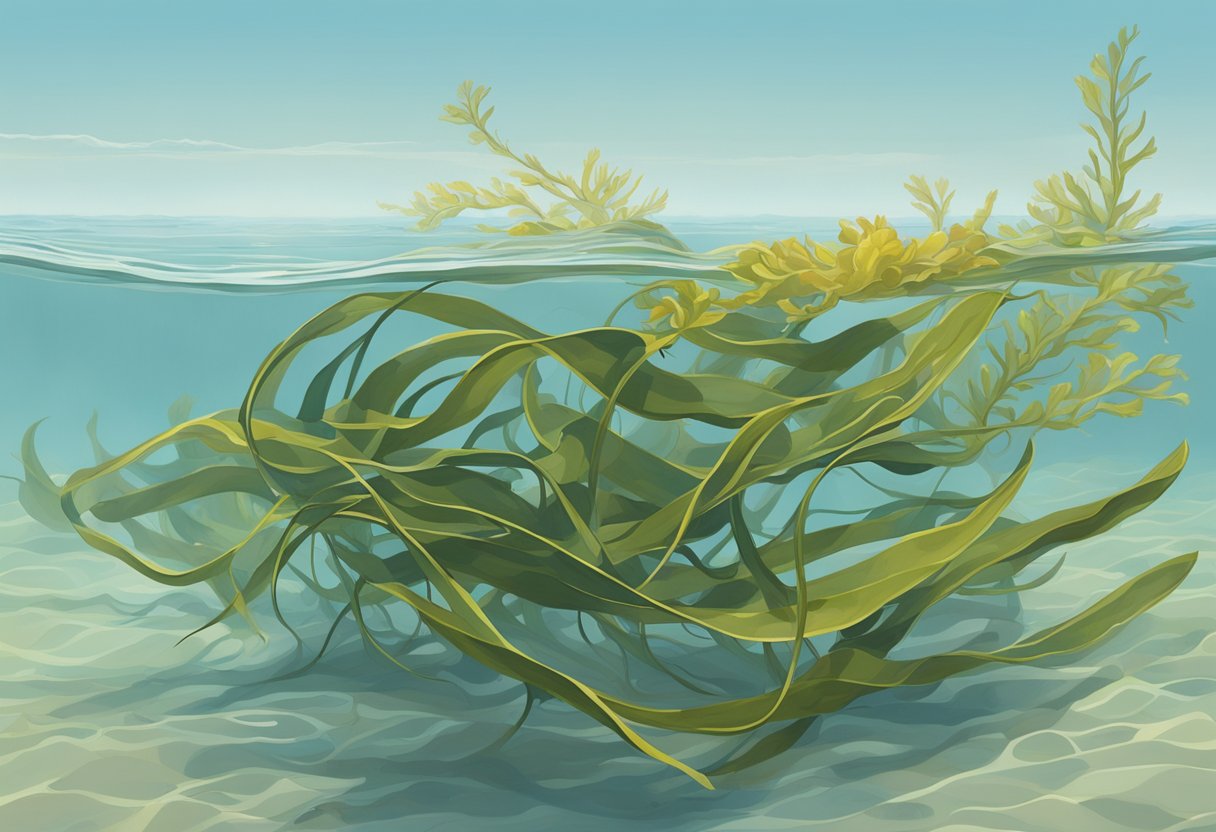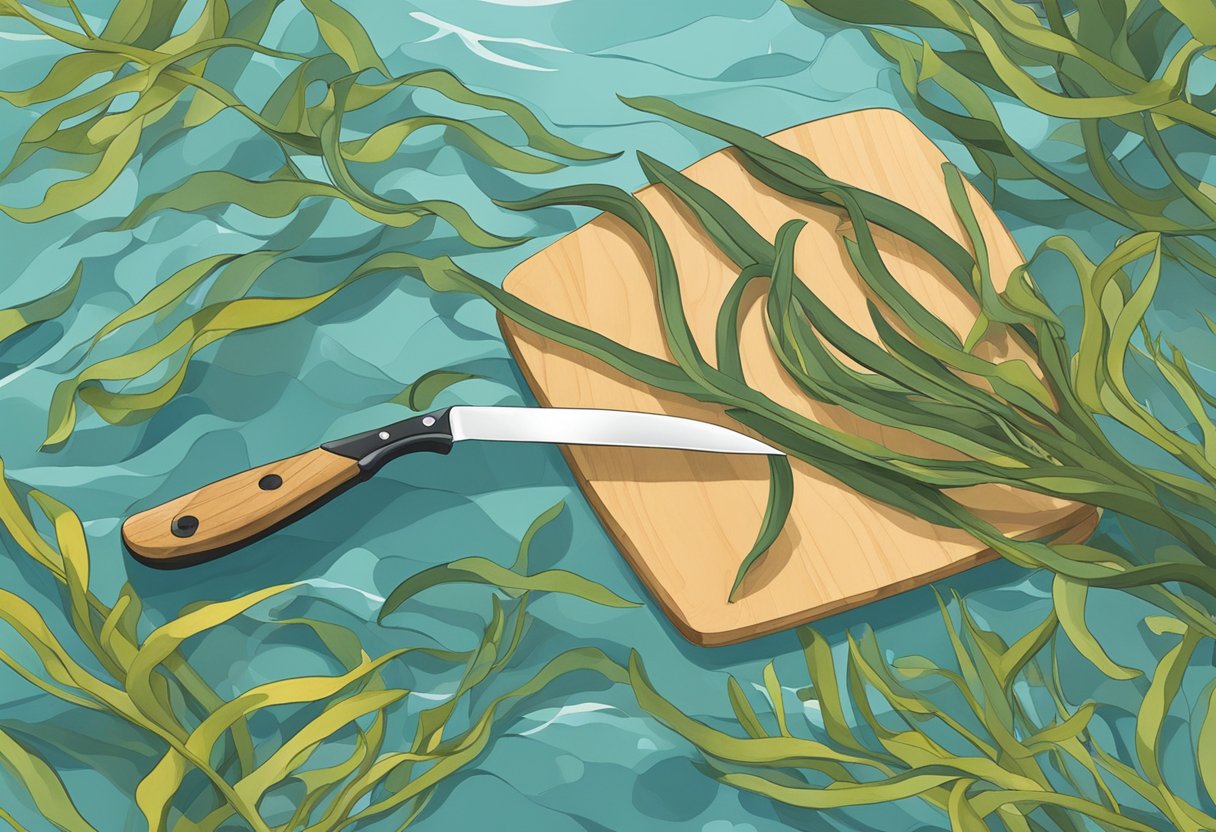Bull kelp is a common name for the large brown seaweed that thrives in the coastal waters of the Pacific Ocean. Known scientifically as Nereocystis luetkeana, it is distinguished by its long, hollow stipe leading to a bulbous top with extending leaf-like blades. The question of whether bull kelp is edible is met with a definitive yes; it has been consumed by coastal Indigenous peoples for centuries and is gaining recognition in modern culinary circles.
The nutritional profile of bull kelp is impressive, offering a low-calorie source of essential minerals such as iodine, potassium, and magnesium. Bull kelp can be prepared and consumed in various ways, ranging from dried forms to pickles. When considering bull kelp as a food source, it's important to understand proper preparation methods to ensure both the safety and the best possible culinary experience.
The use of bull kelp as an ingredient also comes with an environmental perspective. As concern grows regarding the sustainability of our food sources, the harvesting of bull kelp, when done responsibly, can be a sustainable practice. The interest in kelp farming attests to its potential in providing a sustainable and nutritious food source.

Key Takeaways
- Bull kelp is an edible seaweed with a history of traditional consumption and recent culinary interest.
- It is a low-calorie food rich in minerals and can be integrated into diets in various culinary forms.
- Sustainable harvesting and cultivation of bull kelp contribute to its role as an eco-friendly food resource.
Bull Kelp Nutritional Profile

Bull kelp (Nereocystis luetkeana), a type of edible seaweed, offers a range of nutrients beneficial to human health. It is low in calories and an excellent source of essential vitamins and minerals.
Vitamins and Minerals: Bull kelp is rich in iodine, which is crucial for maintaining a healthy thyroid function. It also contains vitamins A, C, E, and K, along with minerals such as calcium, magnesium, iron, and potassium.
Dietary Fiber: This seaweed provides dietary fiber, which aids in digestion and supports regular bowel movements. Fiber may also play a role in managing blood sugar levels and contributing to satiety.
Protein and Amino Acids: Although not a primary source of protein, bull kelp does contain some amino acids, which are the building blocks of proteins.
Fatty Acids: Additionally, it has a variety of fatty acids, including some omega-3s, which are important for cardiovascular health.
Low-Fat Content: Bull kelp is naturally low in fat, making it a healthy addition to various diets.
Important Considerations: One should be mindful of the source of bull kelp, as it can absorb heavy metals and toxins from its environment. Therefore, choosing kelp from clean, unpolluted waters is vital for safety.
Table of Key Nutrients (per 100g of Bull Kelp):
| Nutrient | Amount |
|---|---|
| Calories | 43 kcal |
| Carbohydrates | 9.6 g |
| Dietary Fiber | 1.3 g |
| Protein | 1.7 g |
| Fat | 0.6 g |
| Vitamin A | 116 IU |
| Vitamin C | 3 mg |
| Calcium | 168 mg |
| Magnesium | 121 mg |
| Iron | 2.85 mg |
| Iodine | High Levels |
In summary, incorporating bull kelp into one's diet can provide significant nutritional benefits and contribute to overall health when consumed in moderation and sourced responsibly.
Culinary Uses of Bull Kelp

Bull kelp is a highly versatile sea vegetable that is indeed edible. They are known for their unique texture and flavor, which make them a sought-after ingredient in various culinary creations.
Harvesting and Preparation
When harvesting bull kelp, it's essential to choose healthy, living specimens from clean waters, as this affects both the safety and quality of the kelp. Once collected, kelp should be rinsed thoroughly in fresh water to remove any debris or salt. Bull kelp can be eaten raw, but they are often dried, pickled, or cooked. To dry bull kelp, one can hang it in long strips in a cool, dry place away from direct sunlight. For pickling, bull kelp is typically cut into rings or strips and then submerged in a mixture of vinegar, water, and spices.
Recipes and Dishes
Bull kelp can be used in a variety of recipes and dishes which highlight its unique flavor and texture:
- Pickles: Bull kelp strips or stipes are pickled in a brine of vinegar, water, and seasonings, yielding a tangy and crunchy delicacy.
- Salads: Raw or blanched bull kelp can be sliced and added to salads for a nutritious crunch.
- Soups: Bull kelp can be chopped and integrated into soups, contributing a savory umami flavor.
- Snacks: Dried bull kelp can be turned into chips, seasoned with spices for a tasty treat.
The versatility of bull kelp is showcased through these application methods, where it adds both flavor and a nutritional component to dishes.
Health Benefits and Considerations

Bull kelp, a type of large brown algae, is known for its edible and nutritious parts, which are consumed in various culinary traditions. It is important to consume it in moderation due to its high iodine content.
Nutritional Profile:
- Rich in Iodine: Supports thyroid health.
- High in Vitamins: Contains vitamins A, C, E, and K.
- Mineral Content: Good source of calcium, magnesium, and potassium.
Health Benefits:
- Dietary Fiber: Promotes digestive health.
- Antioxidants: Potentially helps protect cells from damage.
Considerations:
- Iodine Sensitivity: Individuals with thyroid disorders should monitor intake.
- Heavy Metals: Can accumulate toxins from polluted waters.
- When selecting bull kelp, one should ensure that it comes from clean, uncontaminated waters.
- It is advisable to consult with a healthcare provider before integrating it as a regular part of one’s diet, especially for those with pre-existing health conditions.
- Cooking methods can vary; bull kelp can be eaten raw, dried, or cooked, each method offering different textures and flavors.
-
Preparation Tips:
- It is quite versatile and can be added to salads, soups, and stews.
- Drying and powdering it allows for use as a seasoning, providing a savory, umami flavor.
In culinary use, bull kelp is a beneficial ingredient that can enhance a meal with its nutritional value. However, consumers should remain aware of its iodine content and the potential for environmental contaminants.
Environmental Impact and Sustainability
Bull kelp, a species of large brown seaweed, serves as a significant ecological component of marine environments. It provides habitats for diverse marine life and helps maintain oceanic ecosystems. The sustainability of harvesting bull kelp is a matter of careful management to ensure it continues to support its ecological role.
The harvesting of bull kelp must be done with consideration to its life cycle and growth patterns. This seaweed grows rapidly, but unsustainably extracting it can lead to ecosystem disruption. Sustainable practices include:
- Restricting Harvest Zones: Limiting areas where harvesting is allowed to protect critical habitats.
- Seasonal Restrictions: Only harvesting at times that allow for regeneration and minimize impact on marine life.
- Permit Systems: Regulating the amount of kelp that can be taken and tracking its removal.
When including bull kelp in the human diet, its edibility offers potential health benefits, but the impact on local wildlife and habitats necessitates regulation. Furthermore, as a carbon sink, bull kelp forests help mitigate climate change effects. Thus, their protection through sustainable practices is vital from an environmental perspective.
The cultivation of bull kelp in aquaculture settings is an alternative that can alleviate wild stock pressures. Cultivation needs to be conducted in a manner that:
- Minimizes Competing with Wild Stocks: Cultivated kelp beds must not encroach upon or degrade natural habitats.
- Maintains Genetic Diversity: Ensuring the genetic diversity of cultivated stocks to prevent the weakening of native populations.
Overall, sustainability measures are crucial to maintaining the balance between the use of bull kelp as an edible resource and its role in oceanic ecosystems.




